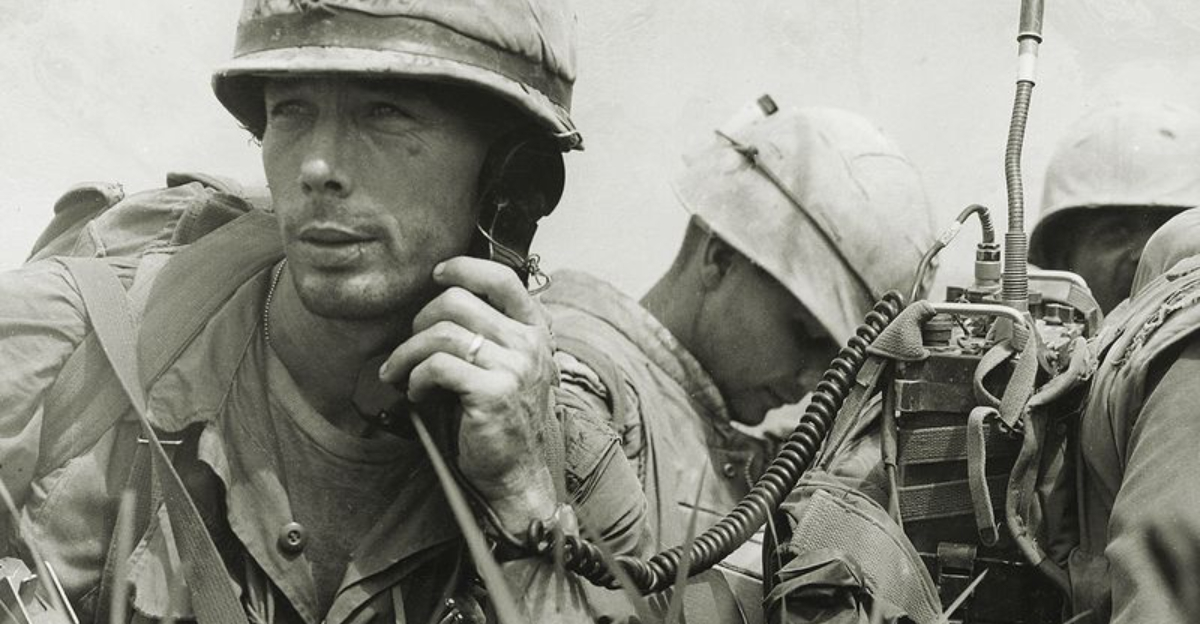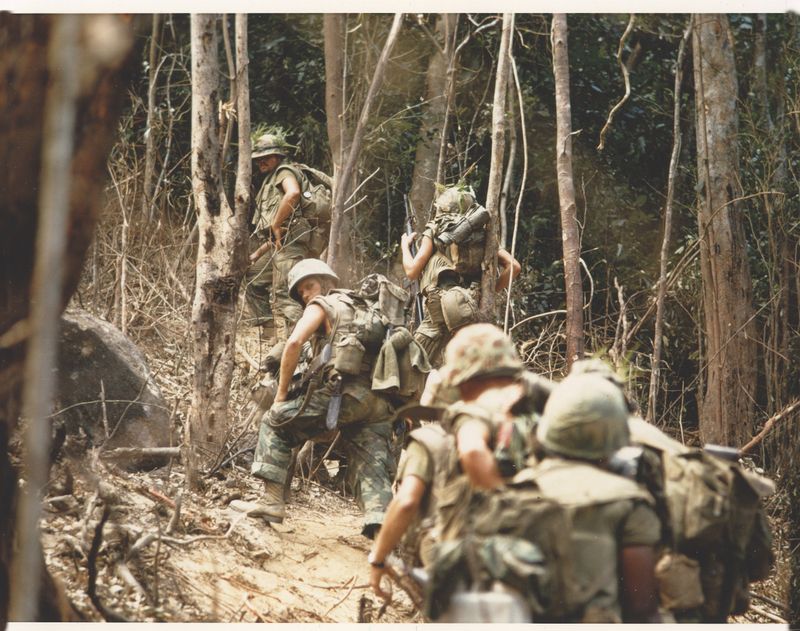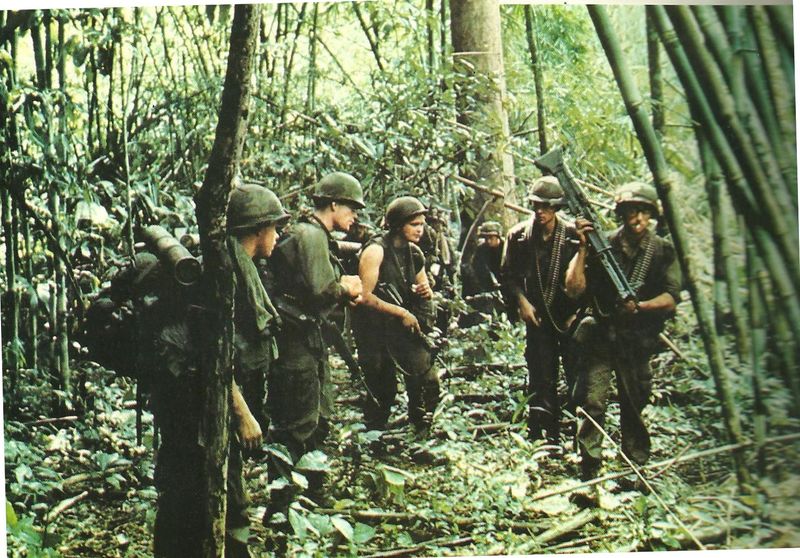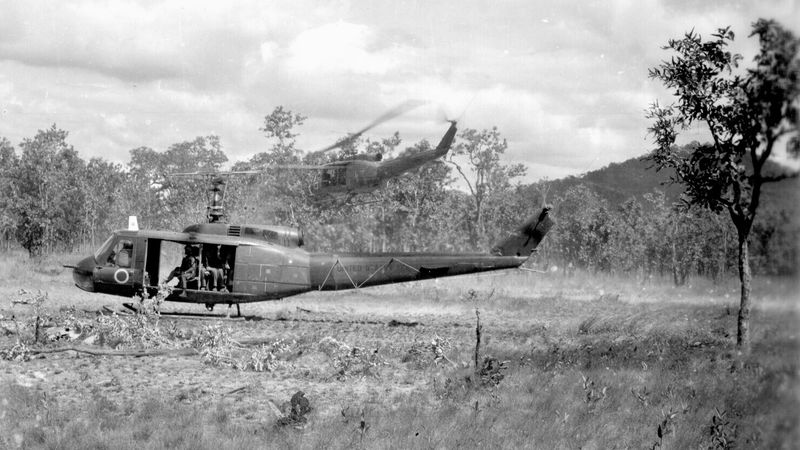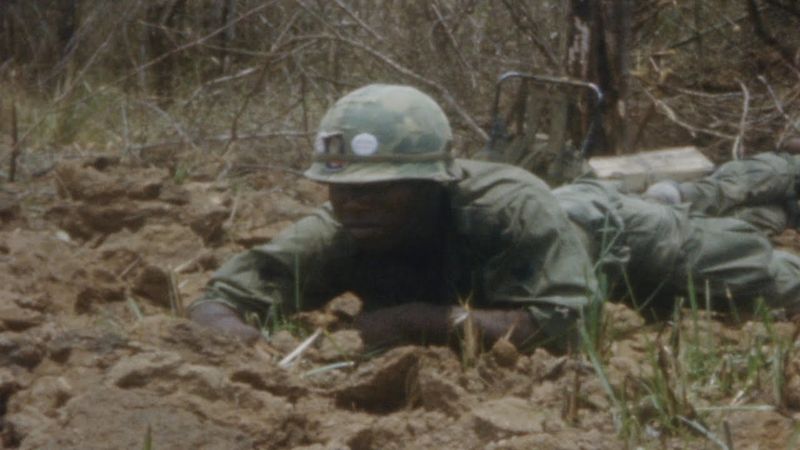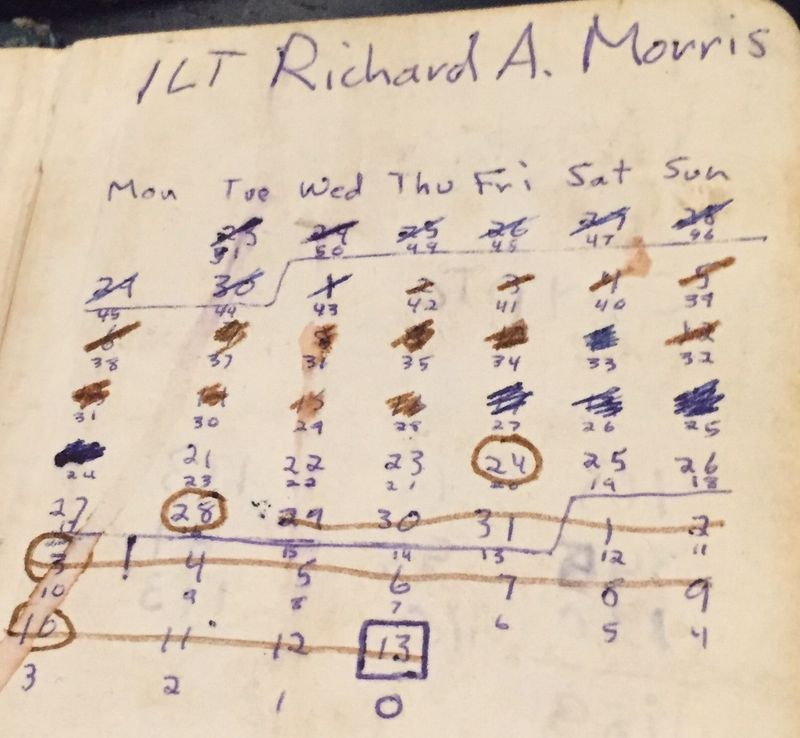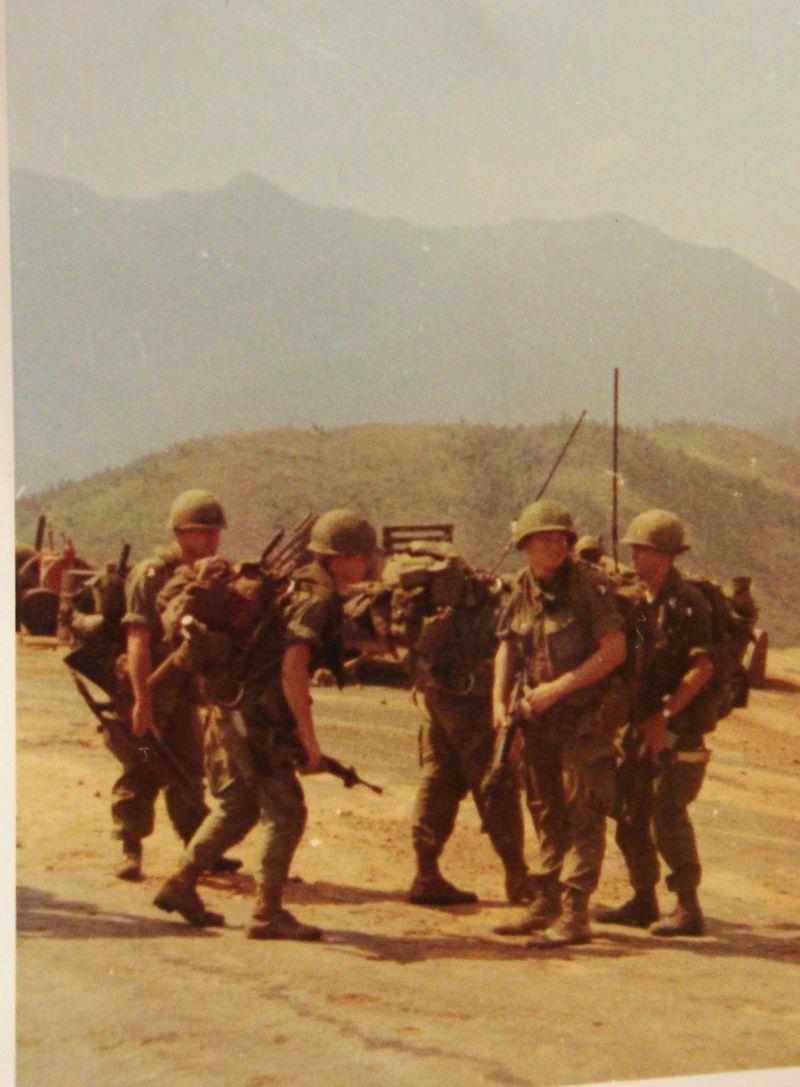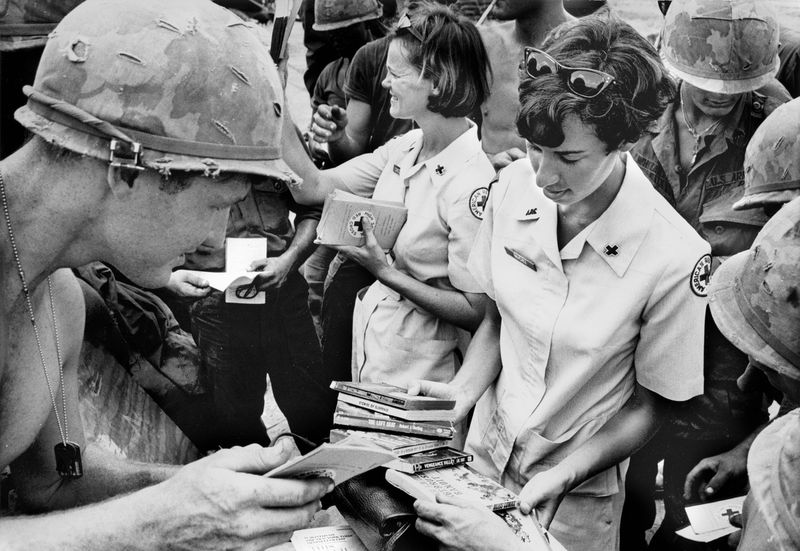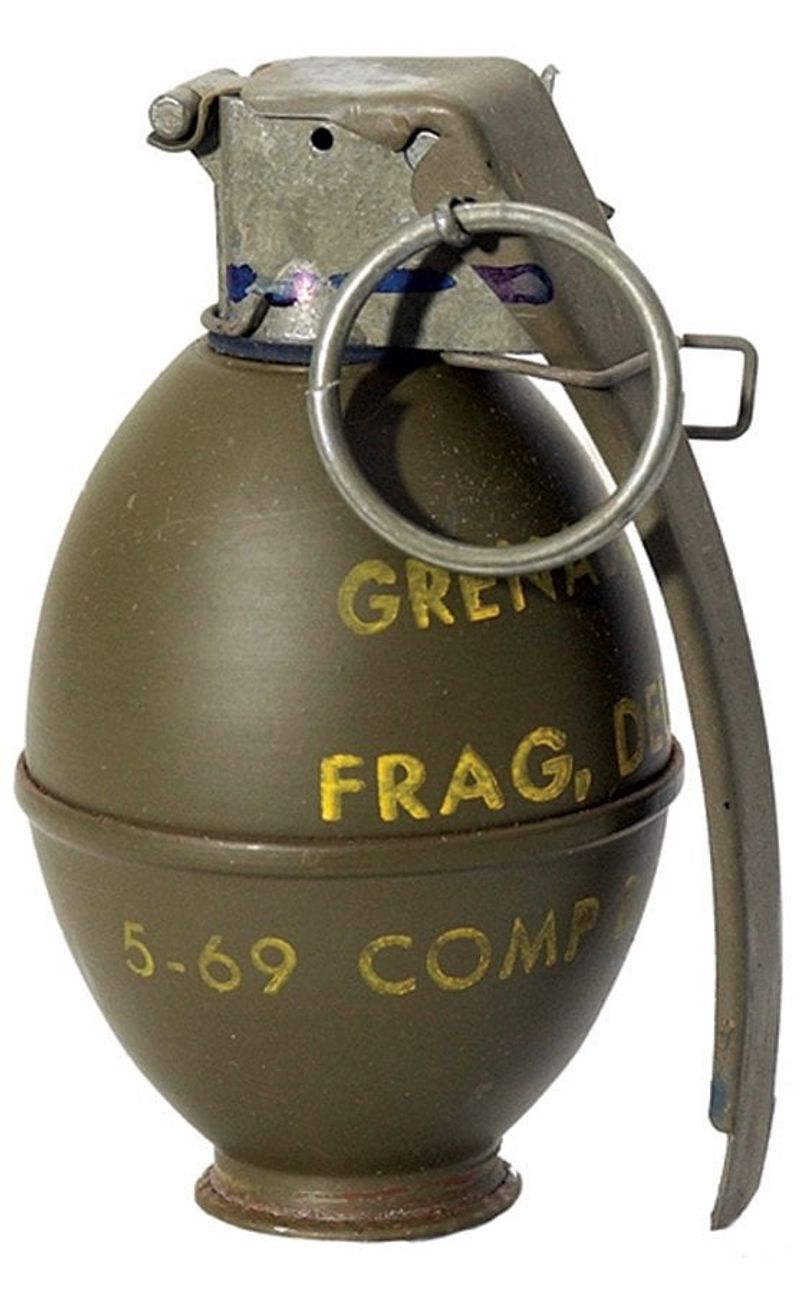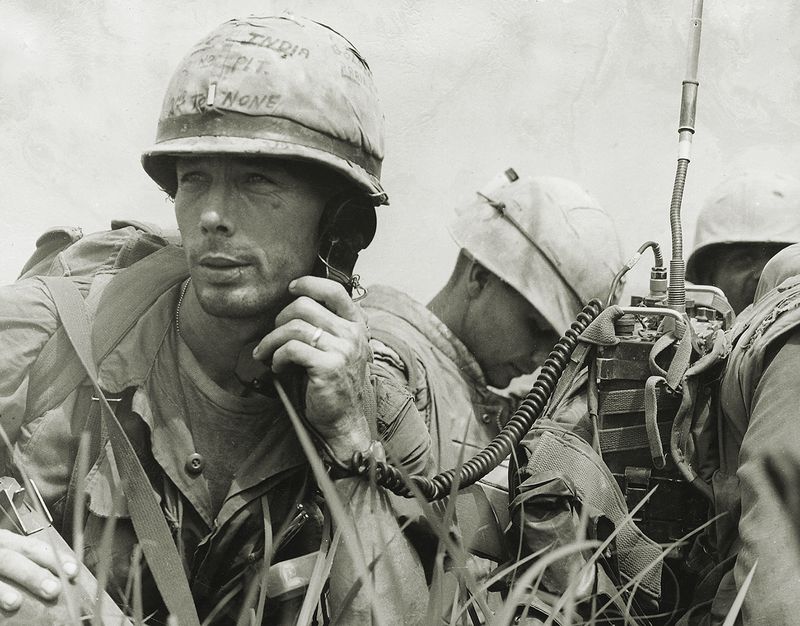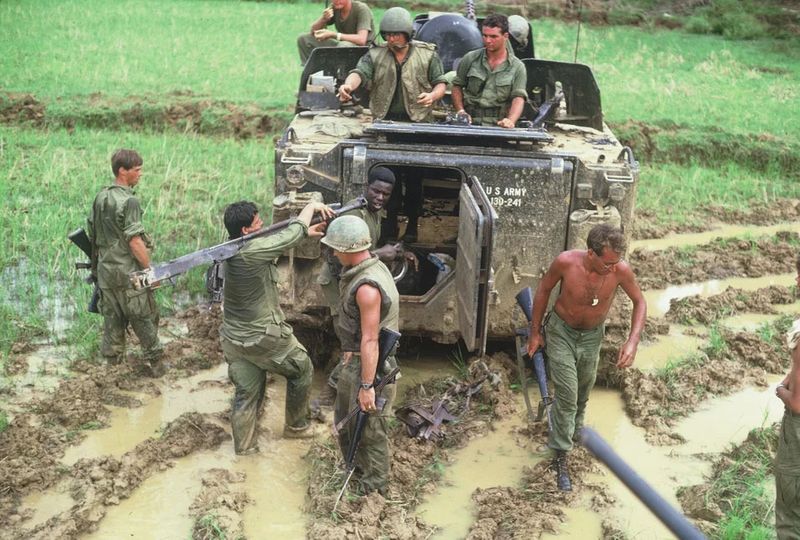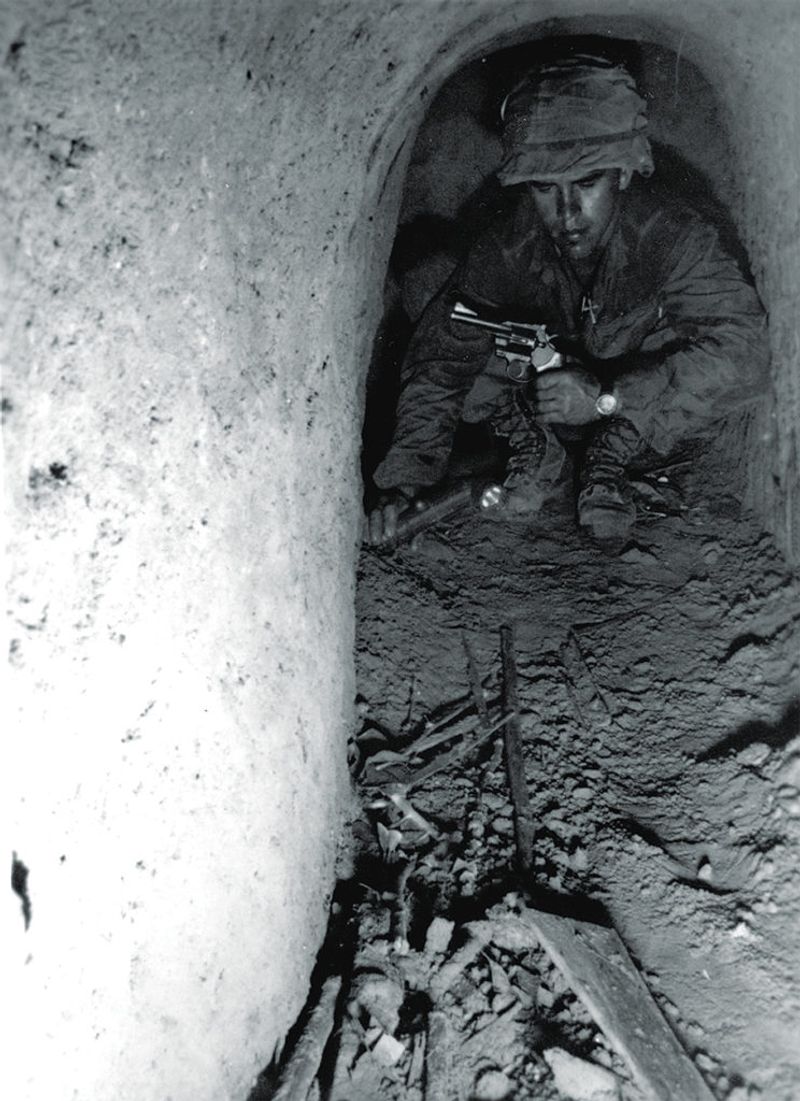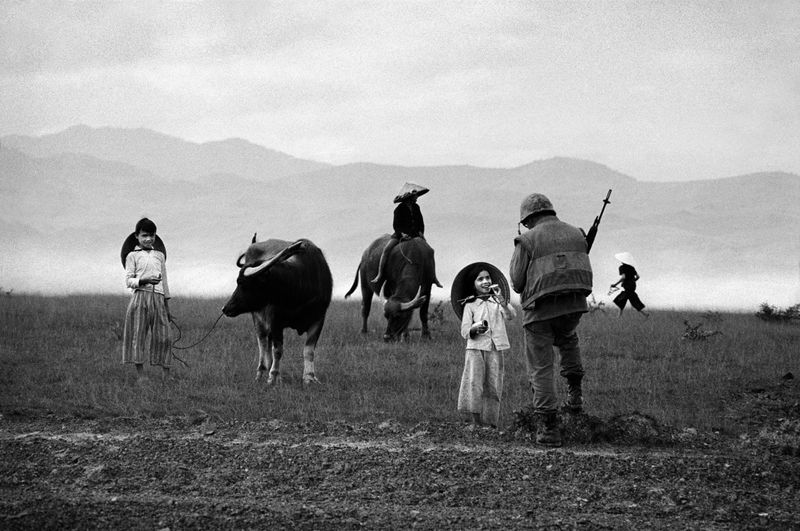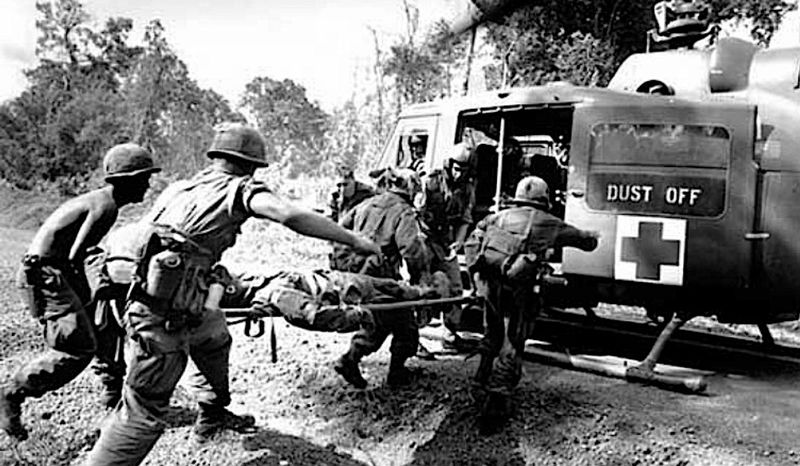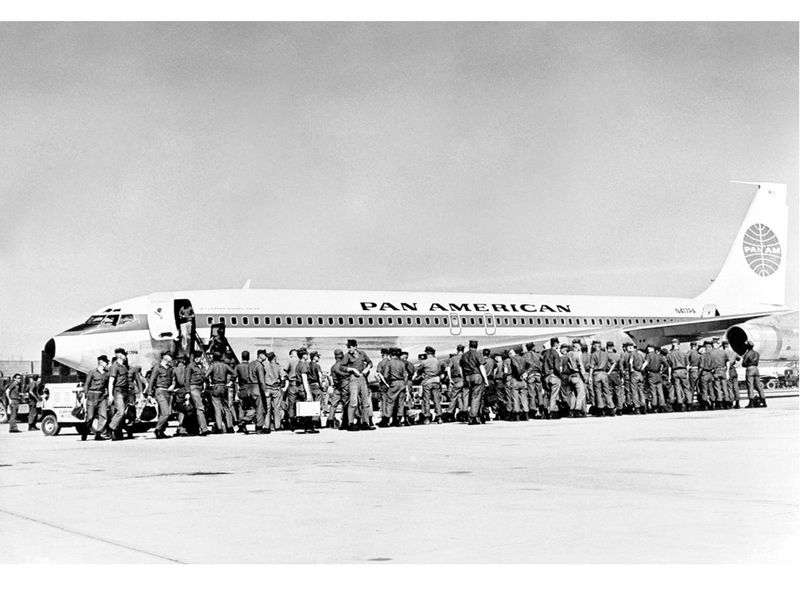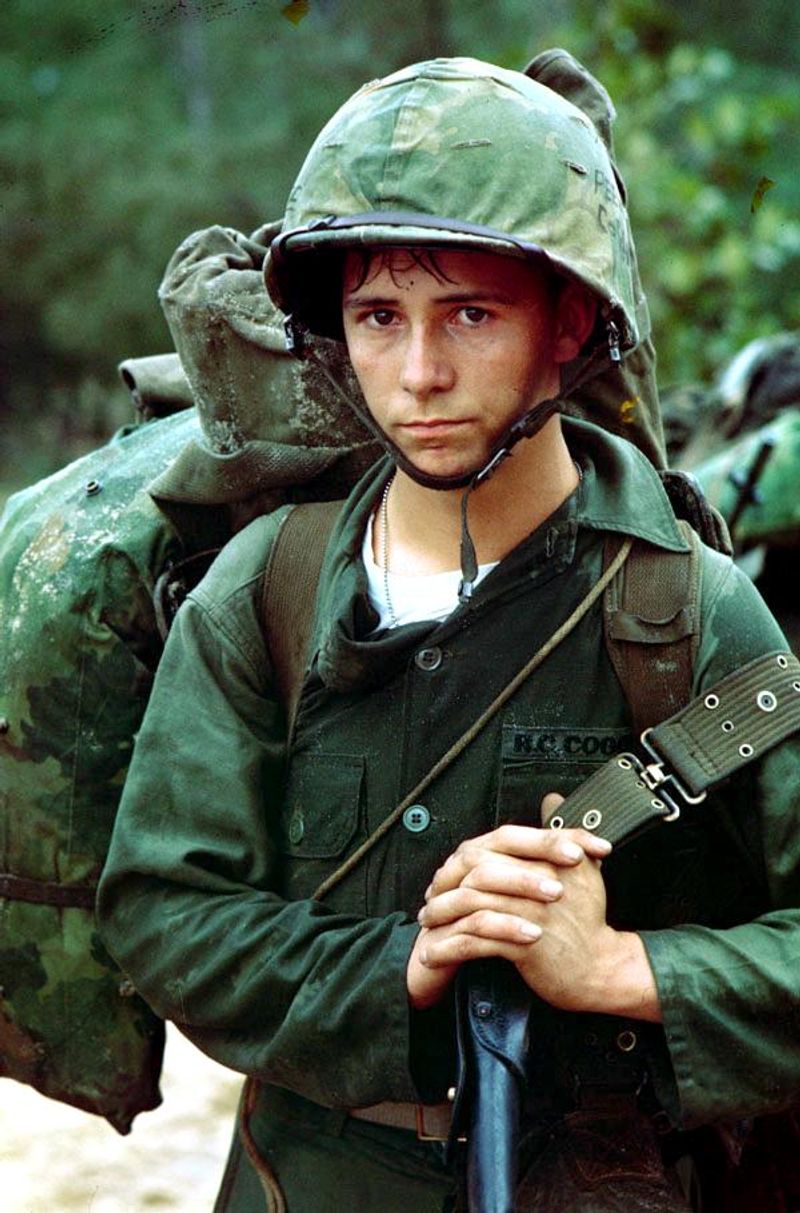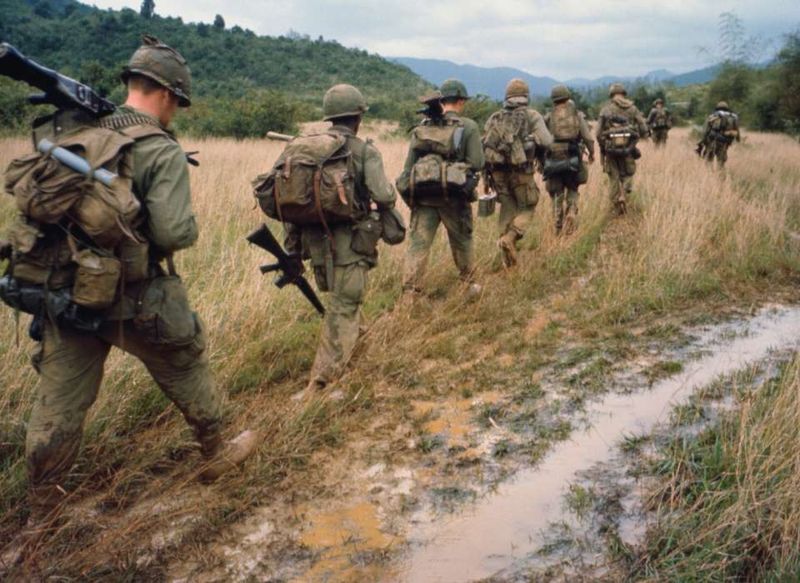The Vietnam War introduced a host of distinctive slang terms that painted a vivid picture of the soldiers’ experiences. These terms range from light-hearted expressions to more serious jargon, each carrying a piece of history and the emotions of those turbulent times.
By exploring these 17 Vietnam War slang terms, we delve into the language that defined a generation and offers insight into the everyday lives of the soldiers who served.
1. Grunt
With their boots firmly on the ground, “grunts” were the backbone of the infantry. These young soldiers, often in their late teens or early twenties, faced the harsh realities of combat head-on.
They marched through dense jungles, carrying their gear and the weight of their mission. The term “grunt” embodies the physical and emotional burden these soldiers shouldered.
Despite the challenges, their camaraderie and resilience shone through, creating a bond that went beyond the battlefield. Each day was a testament to their courage and determination. Search Query: “Vietnam War grunt soldier jungle”.
2. Hump
“Hump” was the term that described the grueling task of carrying heavy loads over long distances. Soldiers, laden with equipment, trekked through the dense Vietnamese jungles, sweat trickling down their brows.
The physical demands were immense, yet it was a necessary part of survival and mission success. Each step taken was a testament to their stamina and perseverance. The jungle, with its thick foliage and hidden dangers, became a silent witness to their endurance and teamwork.
This term encapsulates the physical and mental resilience required of every soldier. Search Query: “Vietnam War soldier humping gear jungle”.
3. LZ (Landing Zone)
In the thick of the jungle, the LZ, or Landing Zone, marked a lifeline for soldiers. These clearings were crucial for helicopters to land, bringing reinforcements, supplies, or evacuating the wounded.
Creating an LZ involved quick thinking and teamwork, as soldiers carved out these vital spaces amidst dense foliage. The whirring blades and flurry of dust signaled both hope and urgency.
Landing Zones became pivotal points in missions, encapsulating the chaos and coordination inherent in Vietnam War operations. Each successful landing was a testament to strategy and bravery. Search Query: “Vietnam War landing zone helicopter jungle”.
4. Charlie
In the coded language of war, “Charlie” referred to the Viet Cong, derived from the phonetic alphabet for “VC” (Victor Charlie). Soldiers traversing the jungles of Vietnam remained ever vigilant, knowing “Charlie” could be lurking in the shadows.
This term captured the constant cat-and-mouse nature of guerrilla warfare, where the lines between ally and enemy blurred. Encounters with “Charlie” were unpredictable, demanding a soldier’s full awareness and adaptability.
The name evoked a mix of respect and fear, embodying the elusive and cunning nature of the Viet Cong. Search Query: “Vietnam War Charlie Viet Cong jungle”.
5. In-Country
Being “in-country” meant a soldier was stationed within Vietnam itself, immersed in the day-to-day realities of the war. From bustling bases to remote outposts, this term encapsulated the full spectrum of experiences on Vietnamese soil.
Life “in-country” was a blend of routine and unpredictability, where camaraderie helped soldiers navigate the challenges they faced. The sights, sounds, and smells of Vietnam became a backdrop to their service, forever etched in their memories.
This phrase highlighted the unique and defining experience of serving in the Vietnam War. Search Query: “Vietnam War in-country military base”.
6. DEROS
For soldiers, DEROS—Date of Expected Return from Overseas—was a beacon of hope, marking the day they could go home. It represented the light at the end of the tunnel, the countdown to being reunited with loved ones.
Each marked calendar day brought soldiers one step closer to normalcy and the comfort of familiar surroundings. In the midst of challenges and danger, DEROS was a personal reminder of resilience and endurance.
This term encapsulated both the longing for home and the pride in service, a poignant part of the Vietnam War experience. Search Query: “Vietnam War DEROS calendar soldier”.
7. Short-Timer
In the countdown to departure, a “short-timer” was a soldier nearing the end of their tour. The term was a badge of honor, signifying the survival of the rigors of war and the impending return to civilian life.
Marked calendars and shared jokes with fellow troops helped short-timers cope with the anticipation and anxiety of leaving. This term captured the bittersweet moment of transition, where relief mingled with the bonds formed during service.
For many, being a short-timer was a time of reflection and gratitude. Search Query: “Vietnam War short-timer soldier camaraderie”.
8. Donut Dolly
In the midst of conflict, “Donut Dolly” was a term of endearment for American Red Cross women. These dedicated volunteers brought a slice of home to soldiers, offering coffee, donuts, and a listening ear.
Their presence was a morale booster, providing comfort and a reminder of life beyond the battlefield. With warmth and compassion, Donut Dollies forged connections that transcended the war’s chaos.
They became cherished figures, embodying kindness and humanity amid the hardships of Vietnam. Their visits left lasting impressions, underscoring the power of empathy and support. Search Query: “Vietnam War Donut Dolly Red Cross”.
9. Fragging
In the shadows of military tents, “fragging” represented a dark chapter in Vietnam War history. It referred to the deliberate killing or attempted killing of an unpopular officer by their own troops, usually with a fragmentation grenade.
This act stemmed from deep-seated frustrations and conflicts within the ranks. The term evokes the complexities of military life, where leadership and loyalty were sometimes at odds.
Fragging highlights the intense pressures and moral dilemmas faced by soldiers, revealing the human cost of war. It remains a sobering reminder of internal struggles amid external conflict. Search Query: “Vietnam War fragging soldier tension”.
10. RTO
In the heat of battle, the RTO, or Radio Telephone Operator, was a crucial lifeline for communication. Carrying a hefty radio on their back, these soldiers relayed vital information across the chaotic battlefield.
The role demanded quick thinking and adaptability, as RTOs navigated the challenges of maintaining contact amidst noise and confusion. Their presence ensured coordination and support, linking the frontlines to higher command.
This term captures the indispensable role of communication in warfare, underscoring the bravery and skill of those who served as RTOs. Search Query: “Vietnam War RTO radio operator battle”.
11. SNAFU
“SNAFU,” short for “Situation Normal: All Fouled Up,” encapsulated the chaos and unpredictability of war. This slang term was a tongue-in-cheek acknowledgment of the often absurd and tangled situations soldiers found themselves in.
Amidst the disorder, troops displayed resilience and humor, turning chaos into camaraderie. SNAFU reflected the ability to adapt and persevere despite challenges.
This term offered a lighthearted perspective on the complexities of military life, revealing the shared experiences that united soldiers. It continues to symbolize the indomitable spirit of those who served. Search Query: “Vietnam War SNAFU camp chaos”.
12. Tunnel Rat
In the shadowy world beneath the jungle, “tunnel rats” embarked on perilous missions to clear Viet Cong tunnels. Armed with flashlights and grit, these soldiers navigated claustrophobic passages, facing unknown dangers at every turn.
The role required courage and quick reflexes, as tunnel rats often encountered traps and hidden enemies. Their efforts were pivotal in disrupting enemy operations, turning the tide in favor of allied forces.
This term highlights the bravery and tenacity of those who ventured into the depths, showcasing a crucial yet often overlooked aspect of the Vietnam War. Search Query: “Vietnam War tunnel rat soldier”.
13. Zipperhead
“Zipperhead” was a derogatory term used by some soldiers for the Vietnamese, reflecting the harsh and often dehumanizing language of war. This slang highlights the complex interactions and perceptions between American troops and the local population.
Amidst the conflict, soldiers grappled with conflicting emotions and cultural misunderstandings. The term serves as a reminder of the power of words and the impact of war on human relationships.
It underscores the need for empathy and understanding, even in the most challenging circumstances. Search Query: “Vietnam War Zipperhead soldier Vietnamese”.
14. Dustoff
In the midst of battle, the call for a “dustoff” signaled a medical evacuation by helicopter. These daring missions aimed to save lives, whisking wounded soldiers away from the frontlines to receive crucial medical care.
Pilots and medics braved enemy fire and challenging conditions, embodying heroism and urgency. The term “dustoff” became synonymous with hope and survival, highlighting the life-saving role of these aerial rescues.
Each successful evacuation was a testament to the skill and bravery of those involved, leaving a lasting impact on the soldiers they aided. Search Query: “Vietnam War dustoff helicopter evacuation”.
15. Freedom Bird
The “Freedom Bird” was the plane that carried soldiers home at the end of their tour. Boarding this aircraft marked the culmination of service and the beginning of a new chapter.
For many, it symbolized relief and the joy of returning to familiar faces and places. The anticipation of stepping onto home soil was a powerful moment, blending emotions of gratitude and reflection.
The Freedom Bird’s departure was a poignant farewell to Vietnam, encapsulating the end of one journey and the start of another. This term remains a cherished memory for countless veterans. Search Query: “Vietnam War Freedom Bird plane soldiers”.
16. Cherry
In the ranks of Vietnam, a “cherry” was a new, inexperienced soldier fresh to combat. This term marked the transition from training to real-world challenges, where book knowledge met battlefield reality.
Mentored by seasoned troops, cherries quickly adapted to the demands of war, learning the ropes in an environment that tested their mettle. This term reflected a rite of passage, where youthful eagerness met the gravity of service.
The journey from cherry to veteran was one of growth, resilience, and camaraderie, leaving an indelible imprint on those who served. Search Query: “Vietnam War cherry new soldier”.
17. The World
For soldiers stationed in Vietnam, “The World” was a poignant term for the United States. It represented the life and normalcy they left behind, often evoked with longing and nostalgia.
As soldiers navigated the challenges of war, thoughts of The World offered solace and motivation. This term embodied the contrast between the chaotic reality of Vietnam and the familiar comforts of home.
It was a reminder of the personal sacrifices made and the yearning for reunion with loved ones. The World remained an enduring symbol of hope and continuity throughout their service. Search Query: “Vietnam War The World USA soldier”.
